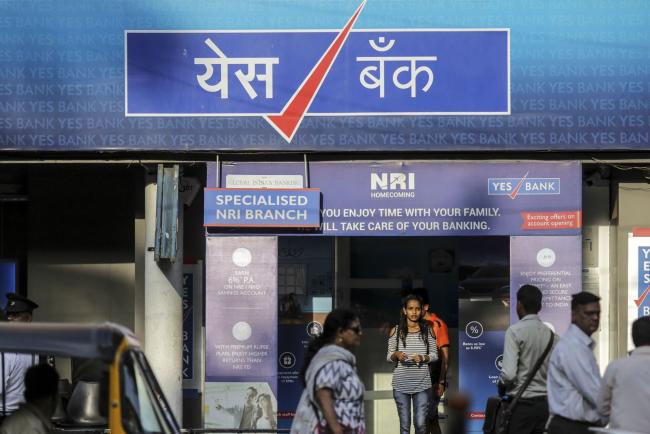(Bloomberg) -- Yes Bank Ltd., an Indian lender caught in the country’s deepening shadow banking crisis, boosted its target for a capital raising to $2 billion after receiving commitments from new investors.
The nation’s fourth-largest private lender said its board signed off on the capital increase, which is higher than the previous figure of $1.2 billion, at a meeting on Friday. Investors including Canada’s Erwin Singh Braich, SPGP Holdings and Citax Holdings Ltd. “individually expressed their agreement/willingness to subscribe to equity shares,” according to a stock exchange filing.
The board will meet again on Dec. 10 to approve a preferential allotment of shares to investors, none of which will receive more than a 25% stake in the bank.
Yes Bank needs to raise new capital after being forced to step up provisioning against bad loans, including to some of the non-bank lenders caught up in the country’s shadow banking crisis. The lender’s core equity capital is 8.70%, barely above the regulatory minimum of about 8%.
There was some disappointment about the lack of a heavyweight international investor among the firms and individuals announced on Friday.
“The market was expecting strong and marquee global names and they are all missing,” said Siddharth Purohit an analyst with SMC Global Securities.
Braich and SPGP Holdings together committed $1.2 billion to the capital increase, the largest single amount, followed by Citax with $500 million, the filing said. The bank will this week disclose the name of a “top tier U.S. fund house” which committed $120 million, it added.
The new shares will be priced at around 78 rupees ($1.09) each based on the average over the past six months, Chief Executive Officer Ravneet Gill said in an interview with CNBC-TV18 on Sunday. That would represent a 14% premium to Yes Bank’s closing price of 68.30 rupees on Friday.
India’s preferential allotment rules bar investors from participating if they have sold the shares during the past six months. That excluded several potential candidates because of the wholesale selling of Yes Bank shares during 2019 -- they are down over 60% from the start of the year.
Yes Bank’s discussions with Erwin Braich and SPGP are ongoing and are “expected to be concluded shortly,” the filing said. In the meantime a binding term sheet has been extended until the end of the year, it added.
Erwin Braich
Braich is the son of the late Herman Singh Braich, Canadian court documents show. The father emigrated to Canada from Punjab at the age of 14 and founded a flourishing sawmill business in the 1950s, and his family became a pillar of a growing Canadian-Indian community, according to a family history recounted by a local museum.
Since the patriarch’s death in 1976, Braich has battled members of his family and creditors in numerous lawsuits, according to Canadian court records.
In 1999, Braich was petitioned into bankruptcy by unidentified creditors and declared zero assets, according to bankruptcy records. KPMG, the trustee, estimated his liabilities at more than C$20 million ($15.1 million), a figure Braich has hotly contested, court documents show. It took four years for creditors to recover C$60,000 in cash and shares, and a decade to discharge the bankruptcy, according to court filings and bankruptcy records.
Braich couldn’t be reached for comment.
Citax Holdings had shareholder funds of 20,107 pounds ($26,000) as of June 30, 2018, according to the last balance sheet filed with U.K. Companies House. Srinavasan Solaraj and Srinavasan Gopala Solaraj are listed as “persons with significant control” over Citax Holdings, but the filing doesn’t provide any contact information.
Approval from the Reserve Bank of India is required for stake purchases in Indian banks of more than 5%. Any non-financial entity can buy up to 10% of a lender, and for a financial entity the cap is 15%. In general the central bank is reluctant to allow larger stakes, though there’s a provision to allow a single investor to pick up 40% or more under special circumstances.
A notable such exception came three years ago when Canada’s Fairfax Financial Holdings Ltd. was allowed to buy a 51% stake in CSB Bank Ltd., then known as Catholic Syrian Bank Ltd. That marked the first time the central bank let a foreign firm take a majority interest in a local lender.
If Braich, SPGP and Citax don’t get clearance from the RBI to invest in Yes Bank, “it may face a tough time maintaining regulatory capital ratios going forward,” Jefferies analysts Nilanjan Karfa and Harshit Toshniwal wrote in a note.
(Updates with Ravneet Gill comments on pricing in eighth paragraph)
